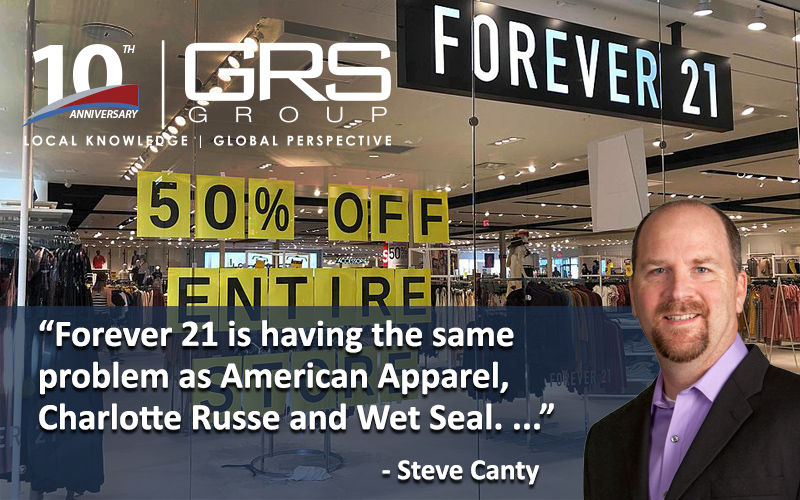It wasn’t too long ago that Forever 21 was looked at as a savior of shopping centers, bucking the trend of big-box stores shutting down. The fast-fashion chain was a welcome addition to shopping centers that got hit by the closures of Circuit City, Borders Group and Linens ‘N Things.
In 2010, it opened a 90,000-square-foot store in Times Square. From 1989 until that time, it expanded from 11 to 480 units. It expanded rapidly during the Great Recession and just prior, taking advantage of large stores left behind by department stores and other chains.
But 2019 is different. The company filed for Chapter 11 bankruptcy recently and announced it is closing 178 stores.
Forever 21 is having the same problem other apparel chains, such as American Apparel, Charlotte Russe and Wet Seal. Their original customer base has grown older, and its expansion plans were too ambitious for today’s environment.
As it says in its bankruptcy filing:
“Like many retailers, the Debtors have struggled to support their outsized store footprint as consumers increasingly purchase clothing and other goods online. … In deciding which stores to shed, the Debtors’ management team and advisors conducted an extensive store-by-store performance analysis of all existing stores to evaluate, among other factors, historical and recent store profitability, historical and recent sales trends, occupancy costs, the geographic market in which each store is located, the mall in which each store is located, the potential to negotiate rent reductions with the applicable landlords, and specific operational circumstances related to each store’s performance.”
Though Forever 21 is one of many chains closing several stores, with 8,500 announced in total so far this year, this situation clearly hurts.
Part of it has to do with the chain’s average unit size, at 38,000 square feet, with some in excess of 100,000 square feet. Those locations won’t be that easy to fill.
But there’s also a demoralizing effect. Forever 21 was a ray of hope that apparel retailers could thrive in the brick-and-mortar retail world if they just had the correct formula that connected with a loyal customer base.
Unfortunately, its story seems similar to the former Steve & Barry’s athletic-apparel chain. Named a “Hot Retailer” by the International Council of Shopping Centers in 2005, it was popular for taking up vacated former department stores and other big boxes and sold licensed college apparel at incredibly cheap prices. It filed for Chapter 11 and completely liquidated by the end of 2009.
It was an exciting chain that drew traffic and filled big vacancies. But it was too good to be true.
About GRS Group
GRS Group is a leading provider of commercial real estate (“CRE”) services worldwide. With offices across the United States, Europe, and affiliates around the globe, GRS Group provides local market knowledge with a global perspective for institutional real estate investors, occupiers and lenders worldwide. The GRS Group team has evaluated and advised on over $1 trillion in CRE transactions.
Through the company’s proprietary management process, Global Services Connection, GRS Group delivers an integrated suite of services including Financial Advisory, Transaction Management, Assessment and Title Insurance. We provide a single point of contact, capable of leveraging the GRS Group portfolio of companies and delivering customized solutions to assist our clients in achieving their investment goals.

